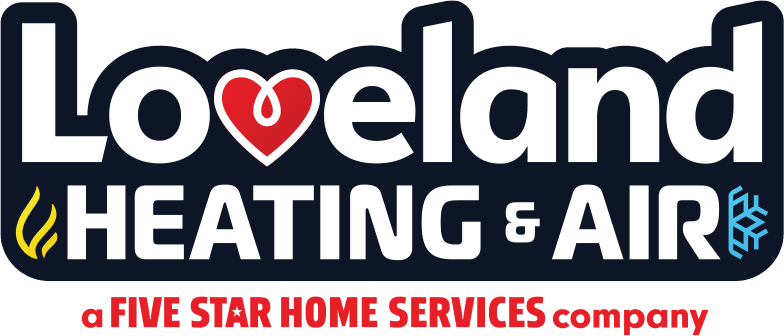A reliable, efficient HVAC system is vital to the health of your family. Because a home’s HVAC system keeps you comfortable throughout the year, it’s important to understand how it works. To assist you in understanding your house’s HVAC system, our specialists at Loveland Heating & Air have compiled a list of three things that every homeowner should know about their HVAC system:
1. What is HVAC, and what does it stand for?
There are three basic functions of your home’s climate control system: heating, ventilation, and air conditioning, which is why the acronym “HVAC” stands for these terms. Thanks to the three responsibilities of your HVAC system, you can keep the temperature and humidity in your house at a comfortable level. Because your home’s HVAC system is one of the most energy-consuming devices, it’s important to understand what these parts represent and how they function. Heating and ventilation are terms that describe the goal of heating your house in order to make it warmer or cooler, depending on the temperature setting on your thermostat. Air conditioning also refers to how an HVAC system uses refrigeration technology and equipment to cool a building or residential home.
2. What Are the Many Types of HVAC Systems?
- Packaged System- This type of HVAC system includes all of the parts in one device. Packaged systems are most often found in small houses with particular HVAC needs, such as zoned heating and cooling.
- Split System: This is a system with an outdoor condenser and compressor unit and an indoor evaporator coil element. They’re great for heating and cooling, and they come in a variety of shapes and sizes. Not to mention, they are the most popular residential HVAC system in the United States.
- Hybrid System: Is a heat pump combined with a conventional heating and cooling system. The heat pump circulates air in the summer, while the furnace circulates air in the winter. Because of this, they are a more versatile choice for properties in regions that experience both hot and cold temperatures. Not to mention that utilizing less power overall lowers energy costs for homeowners, who may save money each month on their utility bills.
- Duct-free Systems- These systems do not require ductwork to distribute conditioned air throughout your property. Instead of relying on a single component, they rely on numerous little tiny parts that are fastened to the walls or ceilings. Ductless technologies are an excellent approach to saving money while also improving your home’s energy efficiency.
3. How Do I Keep My HVAC System in Good Shape?
The easiest way to keep your residential HVAC system in good shape is to schedule and perform regular maintenance. Keep in mind that some activities are simple enough for the average homeowner to perform, such as changing the air filter. Nevertheless, having each unit of your HVAC system serviced and inspected by a professional at least once a year, however, is still advised. Other tasks that should be done regularly include:
- Check the evaporator coils in your air conditioner for dust, dirt, and debris. Dirty evaporator coils might cause the system to work too hard, resulting in higher utility costs.
- Check the area outside your home for any branches, leaves, greenery, or other debris. This will allow your HVAC system to operate more effectively while also increasing air ventilation.
- Check for gaps, holes, or leaks in your ductwork; if found, repair them immediately. A good rule of thumb is if you see your monthly utility cost rising, it’s probable that your ductwork has not been properly sealed. Don’t be concerned if you don’t know how to repair your ductwork; our specialists would be glad to assist!
Knowing how your home’s HVAC system works is extremely beneficial, as it can help you maintain it in excellent working order for many years to come. Furthermore, by being proactive and having an expert perform routine maintenance on your system, you may avoid having to make larger, more expensive repairs or replacements in the future.
We hope that this guide to “HVAC Basics That Every Homeowner Should Know” will assist our customers in recognizing how significant their home HVAC system is. These little details are important, and they can help your system in performing at its peak efficiency and last for several years to come. Do you need to schedule your annual preventative maintenance? If so, call Loveland Heating & Air today at (513) 216-5913, or schedule an appointment online now by clicking here!





